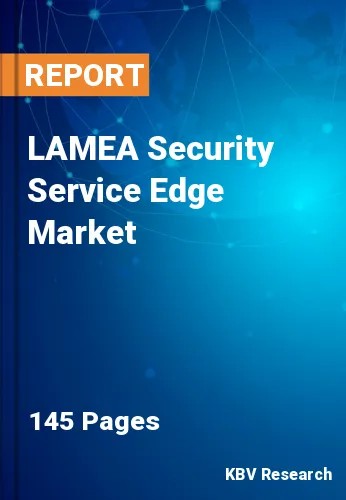The Latin America, Middle East and Africa Security Service Edge Market would witness market growth of 27.2% CAGR during the forecast period (2023-2030).
Cyber threats' persistent and evolving nature has become a significant driver for SSE adoption. With cyberattacks becoming more sophisticated, organizations seek advanced security solutions like SSE to protect their digital assets and sensitive information. As organizations undergo digital transformation initiatives, there is a growing demand for security solutions that can adapt to the changing IT landscape. SSE aligns seamlessly with digital transformation goals, providing the security framework for modern, cloud-centric environments. Organizations must comply with stringent regulations, and SSE offers a comprehensive security approach that aids in meeting compliance requirements, safeguarding sensitive data, and avoiding legal ramifications.
The shift towards remote work has become a permanent aspect of the modern work environment. SSE addresses the security challenges associated with remote access, ensuring employees can work securely from any location without compromising organizational data integrity. The increasing complexity of IT environments, with a mix of on-premises, cloud, and hybrid infrastructures, necessitates a security solution that seamlessly integrates and protects across these diverse landscapes. SSE provides a unified security architecture that simplifies the management of security policies and controls.
The International Trade Administration reports that Saudi Arabia finances sixty percent of the healthcare expenditures of Gulf Cooperation Council (GCC) nations. The Saudi Arabian government continues to prioritize this sector. It will invest $36.8 billion in healthcare in 2022. The adoption rate of telehealth in Saudi Arabia is estimated to be around 70 percent. The increasing use of telemedicine and remote patient monitoring solutions in Saudi Arabia requires secure communication channels. SSE facilitates secure and reliable connections, ensuring the confidentiality and integrity of patient information exchanged between healthcare providers and patients. The above aspects will expand the market growth across the region in the upcoming years.
The Brazil market dominated the LAMEA Security Service Edge Market by Country in 2022, and would continue to be a dominant market till 2030; thereby, achieving a market value of $70.9 million by 2030. The Argentina market is showcasing a CAGR of 27.8% during (2023 - 2030). Additionally, The UAE market would register a CAGR of 26.8% during (2023 - 2030).
Based on Component, the market is segmented into Solution (Zero Trust Network Access, Cloud Access Security Broker, Secure Web Gateways, Firewall-as-a-service and Others), and Services. Based on End-Use, the market is segmented into BFSI, Healthcare & Life Sciences, Education, IT & Telecommunications, Government, Retail & E-commerce, Manufacturing and Others. Based on countries, the market is segmented into Brazil, Argentina, UAE, Saudi Arabia, South Africa, Nigeria, and Rest of LAMEA.
Free Valuable Insights: The Worldwide Security Service Edge Market is Projected to reach USD 3.9 Billion by 2030, at a CAGR of 24.1%
The market research report covers the analysis of key stake holders of the market. Key companies profiled in the report include Cisco Systems Inc., Cloudflare, Inc., Citrix Systems, Inc. (Cloud Software Group, Inc.), Trend Micro Inc., Fortinet, Inc., Zscaler, Inc., Palo Alto Networks, Inc., Forcepoint LLC (Francisco Partners), Aruba Networks (Hewlett Packard Enterprise Company) and Broadcom, Inc.
By Component
By End-Use
By Country
Our team of dedicated experts can provide you with attractive expansion opportunities for your business.

